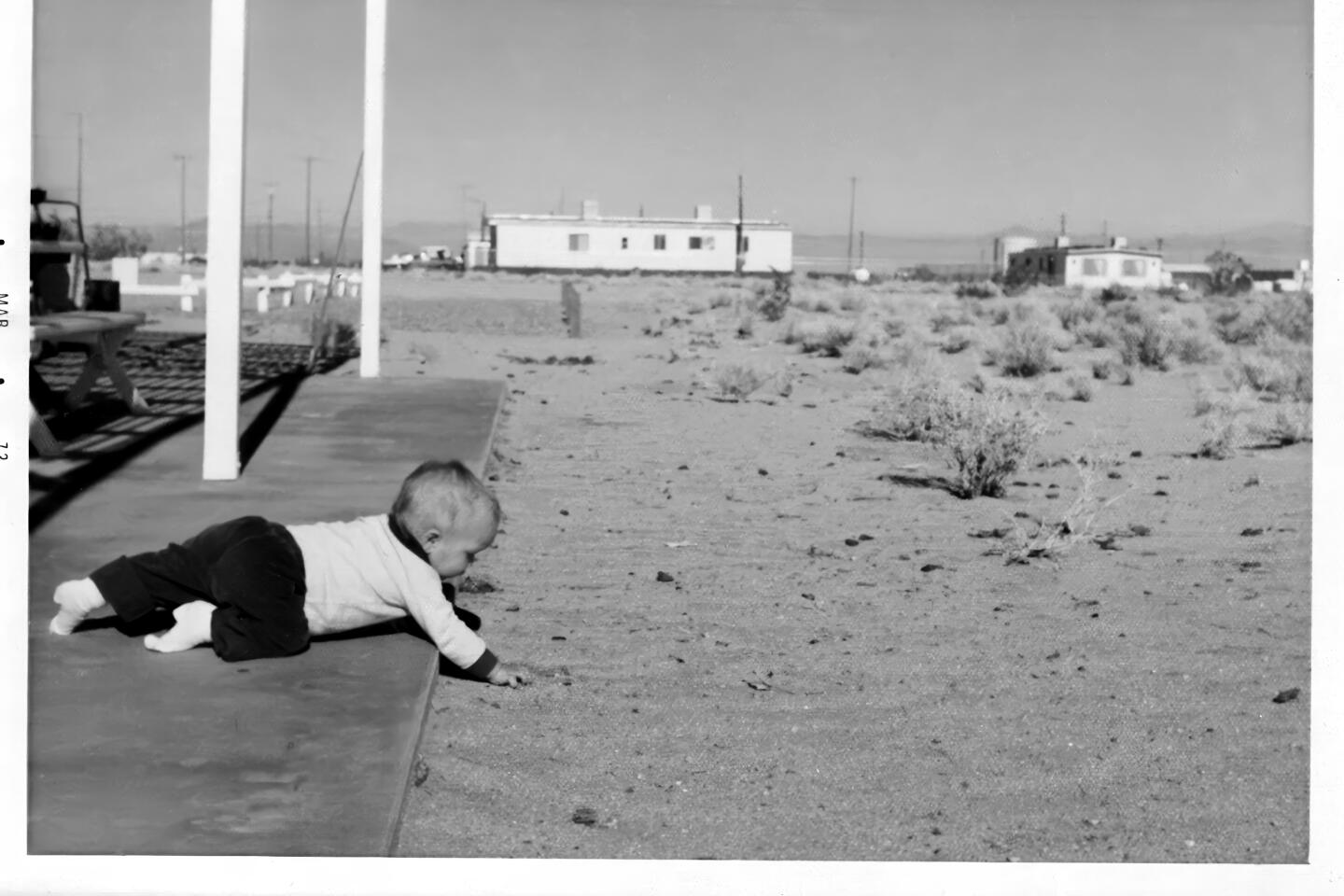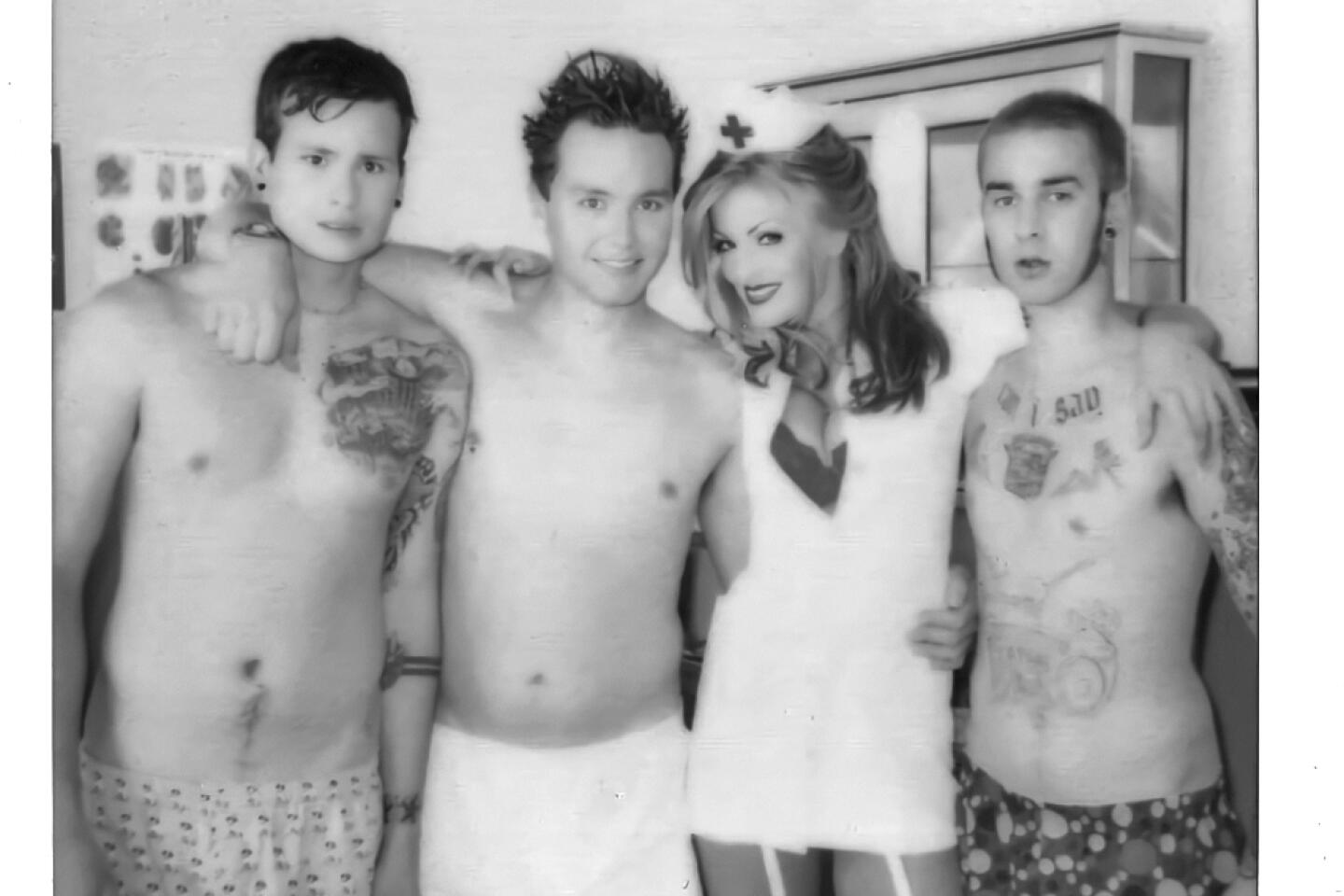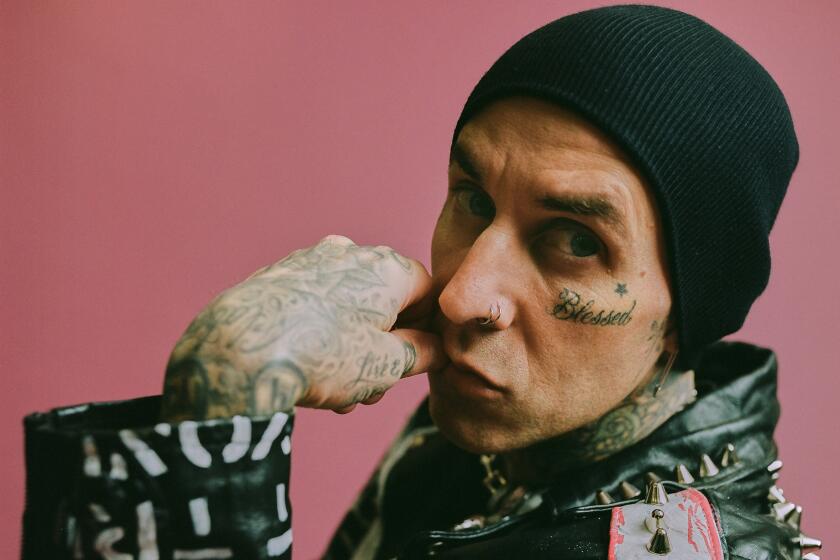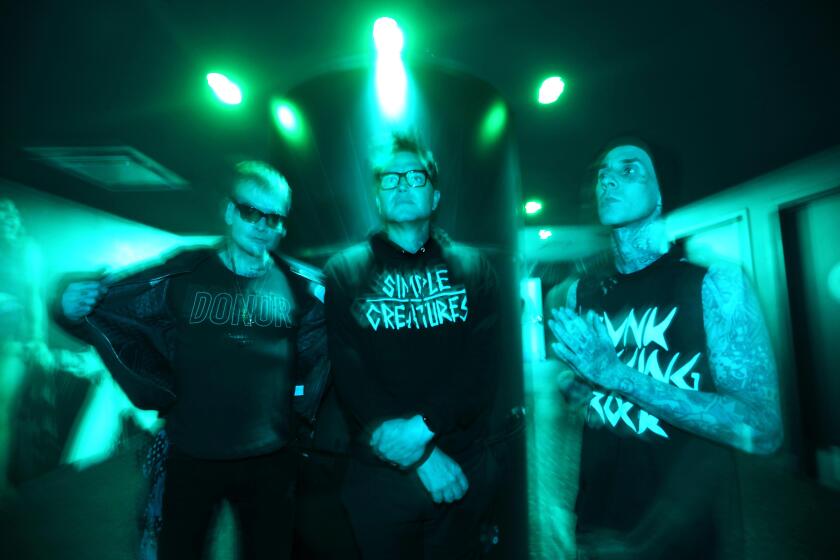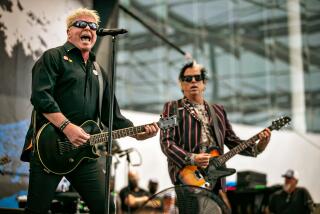
- Share via
On the Shelf
Fahrenheit-182
By Mark Hoppus with Dan Ozzi
Dey Street Books: 400 pages, $33
If you buy books linked on our site, The Times may earn a commission from Bookshop.org, whose fees support independent bookstores.
It was September 2021 and Mark Hoppus had just completed six months of aggressive chemotherapy. Blink-182 had re-formed and the stars had aligned for Hoppus, guitarist Tom DeLonge — who had left the band in 2015 — and drummer Travis Barker after a tumultuous decade.
For the record:
9:39 a.m. April 7, 2025An earlier version of this article misstated Mark Hoppus’ birthplace. He was born in Ridgecrest.
Hoppus had been diagnosed with a type of non-Hodgkin lymphoma in June 2021, resulting in intensive treatment before he was declared cancer-free. To cope with the stress and exhaustion, his doctor suggested he write. What began as a form of therapy transformed into the book “Fahrenheit-182,” which recounts his life, from a military kid to a punk-loving, skateboarding teenager to a rock star with millions of fans.
In the memoir, the 53-year-old chronicles the devastating impact of his parents’ divorce and falling in love with punk rock through bands including Social Distortion, Bad Religion, Dead Kennedys and NOFX. The real love story of “Fahrenheit-182,” ultimately, is the trio behind Blink’s success: Hoppus, DeLonge and Barker. Still, those relationships were tested and strained repeatedly, and in recalling those tribulations, Hoppus has tried to be empathetic with all involved.
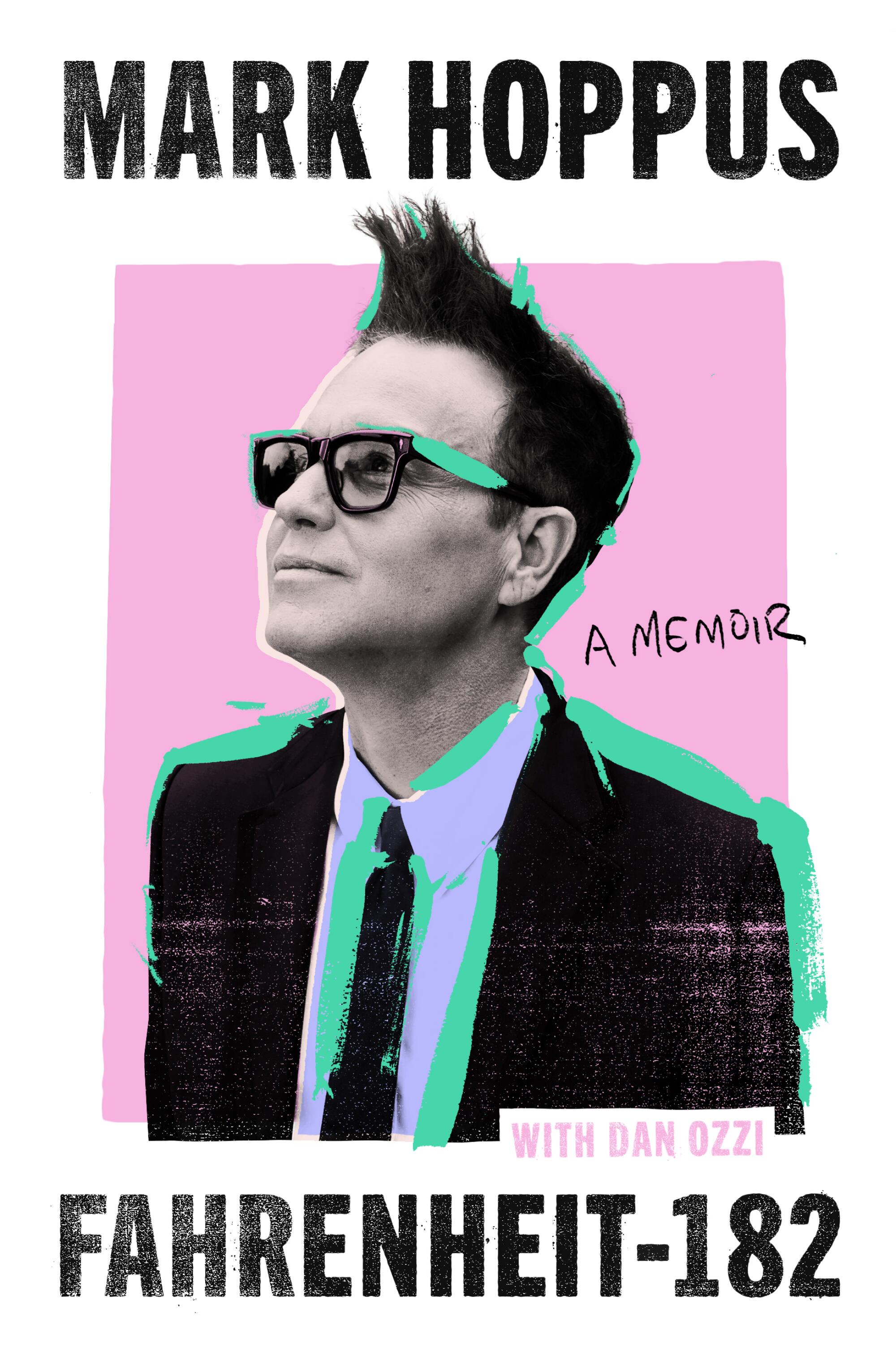
Hoppus says, “It was really cathartic to write it all out and try to be fair to everybody in the book. My whole goal with the book was to not demonize anybody. I wanted there to be no villains in the book because, now that we’ve been through everything, I don’t feel that there were villains. I feel like Blink-182 is a blessing.”
He explains, “When my cancer went into remission, and I felt like I had dodged a bullet, I wanted to tell the story of Blink-182 and not necessarily just my story, but the story of the band from somebody in the band. I love Tom and Travis so much, and everyone just wanted to tell our story as it is, up to now: all the highs, all the lows, the brotherhood, the friendships, everything.”
He doesn’t shy away from recounting breakups, makeups and legal and personal battles between the friends and bandmates, but there is a patina of sadness over these anecdotes, rather than bitterness or blame-laying.
“I had to write about things that Tom and I disagreed on back in the day, but I wanted to put his perspective fairly in it as well. And the same with Travis, and arguments we had as a band. It made me look at things that had defined my life in a different way, seeing arguments that we’d had from other people’s perspective. It gave me a lot of closure on a lot of old animosities and grudges. It was very healing to write like that.”
Hoppus has a knack for storytelling, which will come as no surprise to fans of the band’s eminently quotable lyrics.
Born in Ridgecrest in Kern County in 1972, Hoppus writes, “To survive in the desert is a one-in-a-million shot. In this environment, nothing grows. Nothing lasts. Nothing makes it out or thrives. But somehow, I did. One-in-a-million happens to me all the time.”
Travis Barker is a survivor who loves a challenge. He’s touring with Blink-182 (don’t clean the blood off his drums) and expecting a baby with Kourtney Kardashian.
Hoppus was a top student and a high-achiever until his parents’ divorce. It resulted in being bounced between his parents’ various homes, getting accustomed to their new partners and often living apart from his beloved younger sister Anne.
By 1992, the skateboarding, spiky-haired teenager finally listened to his parents’ pleas and enrolled in college, which reunited him with his mother and Anne in San Diego. Having dabbled in various high school bands, Hoppus was determined to “be a dude in a band. My friends and I against the world. Like a Ramone.”
Anne’s boyfriend introduced Hoppus to local guitarist DeLonge, who was equally determined to be a dude in a band. The two recruited a drummer who would ultimately be replaced by Barker in 1998 during the tour for the band’s second album, “Dude Ranch.”

Hoppus recalls in the book, “Tom and I became fast friends and bandmates. He had a whole social circle, a group of godless miscreant skate rats. These were my people. I fell right in. We spent those sweaty, carefree weeks terrorizing the unsuspecting residents of San Diego. We were young and stupid and unstoppable.”
Blink-182 made its famed name on a brand of boyish, humor-laden punk songs that defied the grunge trend of the early 1990s to top Billboard charts and achieve platinum sales. The trio has ridden out more than three decades of personal and professional tumult; Hoppus and DeLonge’s relationship was at times as rocky and passionate as a marriage. For decades, they lived out of touring vans and cramped roadside hotel rooms while riding the roller coaster of popularity, and bearing the brunt of record label demands, unpredictable audience responses and DeLonge’s fascination for aliens and UFOs. When DeLonge started other bands, Box Car Racer in 2001 and Angels & Airwaves in 2005, it seemed destined that Blink-182 wouldn’t survive the band’s personal and professional divisions.
Fans maintained their fervor regardless of Blink-182’s internal friction. Teenagers who’d discovered the band on tiny stages in the back of bars or through word of mouth and cassette tapes at parties have stuck with the trio for decades, and Hoppus remains equally loyal to them.
Hoppus says, “From the very beginning, I used to have a P.O. box that people would send a self-addressed, stamped envelope to, and I would put stickers or, as a band, we’d make up some silly newsletter that we would mail out to people. We always sold our own merch at shows. I still have a Discord [a messaging and VoIP platform] that I hang out on almost every day and answer questions [from fans].”
He adds, “What I love about Blink is that there’s no hierarchy between the band and the people who come see us play. I don’t even like saying our ‘fans’ because I feel like Blink-182 is a big party and everyone’s invited to it. And I love that people feel that kind of ownership of our music and our band.”
In his new memoir, Heartbreakers guitarist Mike Campbell recalls the highs and lows of working with Tom Petty.
It hasn’t been smooth sailing in the music press though. Blink-182’s humor has long rubbed some critics the wrong way, but it is the dismissal of the band’s punk rock credibility that really infuriates Hoppus. In 2023, the Guardian sniped “their shtick wears thin at times.” A year later, a reviewer described the band’s closing set at Lollapalooza as “cringe-worthy and repulsive.”
Today, they’re still unstoppable as a unit. Hoppus says, “Blink-182 is the heart of all of us, and I think that over the past 15 years, from the band breaking up the first time until now, everybody’s felt like they’ve had Blink taken from them in one way or another, and felt the loss of what Blink-182 is. It’s made us realize the joy of our band, and this special chemistry that happens when the three of us get in a room together. When we’re throwing ideas back and forth, and it’s hitting, there’s no feeling like it in the world. It’s better than any drug. Walking out of a studio with a song that you love, that didn’t exist the day before, is … unbelievable.”
Released in 2023, the band’s ninth album, “One More Time…,” showcased the trio’s signature blistering guitars, pummeling drums and songwriting prowess. It was the band’s third chart-topping album, debuting at No. 1 on the Billboard 200 the week after its release. It was a triumph that the band hadn’t achieved since 2001 with “Take Off Your Pants and Jacket” and 1999’s “Enema of the State.”
This time, chart-topping albums and touring aren’t the discombobulating affair they were nearly 30 years ago, when their second album, “Dude Ranch,” went gold. It passed the half-million sales mark within eight months of release and the band embarked on a relentless campaign to achieve worldwide recognition.
Despite a tumultuous lineup change in 2015, the trio remain a rock staple, and their new album tackles modern sounds and the plague of mass shootings.
Hoppus writes, “We jumped on every tour and festival that came our way. Right after the album was released in June of ’97, we spent another summer on the Warped Tour, then went right into a U.S. tour with Less Than Jake, then headed off to Europe for a month, then ended the year playing all the rock radio Christmas shows that record labels push you to do to supposedly help get your songs on the airwaves.”
Soon after, loneliness and a sense of being unanchored led Hoppus to write “Adam’s Song” as he contemplated taking his own life. Its success was bittersweet and the rawness of the song hasn’t dissipated with time.
“I have a very hard time with it,” he says. “I wrote that song when I was in a really bad place. Our band was taking off and we were signed to a major label, but I felt really lonely when I got home from tour. I just was home by myself in an empty house, and feeling professionally fulfilled but personally empty in a lot of ways. When we got back together as a band, I would start the song every night of the tour by saying, ‘I wrote this song back in the day when I was in a bad place, and it saved my life then. This band and Tom and Travis saved my life a second time when I was sick with cancer. So this song is about that feeling.”
Hoppus sprinkles references to life-saving moments and his incredibly good luck throughout our interview and his book. Indeed, that fortuitous moment back in 2021, when the seed of “Fahrenheit-182” was sown, was the beginning of so much, and the momentum hasn’t ceased.
Hoppus says that since the band reunited three years ago, “there’s no signs of stopping, so that’s awesome. And this book isn’t like my farewell. It’s just a milestone marker.”
Hoppus will be discussing “Fahrenheit-182” at the Wiltern at 4 p.m. April 20 .

More to Read
Sign up for our Book Club newsletter
Get the latest news, events and more from the Los Angeles Times Book Club, and help us get L.A. reading and talking.
You may occasionally receive promotional content from the Los Angeles Times.
